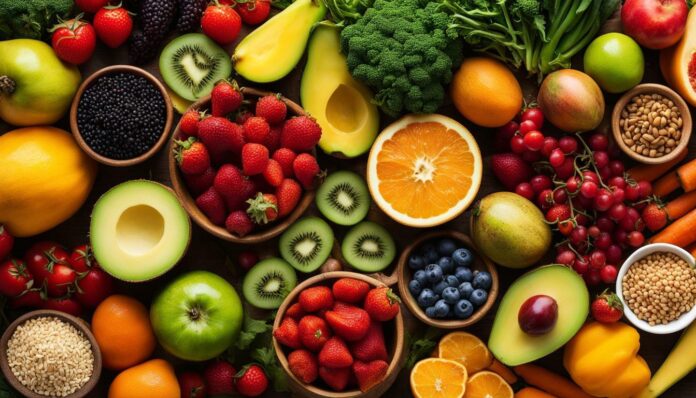Are you ready to unlock the secrets of healthy eating and transform your life into one full of energy and enhanced well-being? Healthy eating is not just about losing weight; it has many benefits beyond physical appearance.
By nourishing your body with the right nutrition and adopting a balanced diet, you can experience improved digestion, boosted mental health, increased energy levels, and reduced risk of chronic diseases such as heart disease, stroke, diabetes, and certain types of cancer.
As you embark on your journey towards healthier eating habits, it is important to focus on incorporating whole foods, practicing clean eating, and exploring the art of mindful eating. By including fresh fruits and vegetables, lean proteins, and healthy fats while avoiding processed foods and watching portion sizes, you can ensure a well-balanced diet that promotes optimal health.
Meal planning plays a crucial role in maintaining healthy eating habits. By planning your meals ahead of time, you can make nutritious choices, save time and money, and avoid the temptation of unhealthy options. Additionally, cooking at home more often and getting creative with healthy ingredients can add excitement and variety to your meals.
Key Takeaways:
- Healthy eating goes beyond physical appearance and has numerous benefits for overall well-being.
- A balanced diet that includes fresh fruits, vegetables, lean proteins, and healthy fats is essential for optimal health.
- Meal planning, cooking at home, and incorporating whole, unprocessed foods can help you maintain a healthy lifestyle.
- Mindful eating, savoring each bite and listening to your body’s hunger and fullness cues, can promote a healthier relationship with food.
- Making small, sustainable changes to your diet is key for long-term success in achieving and maintaining a vibrant life.
Why Healthy Eating is Essential for Overall Well-being
Healthy eating goes beyond just maintaining physical appearance; it plays a vital role in enhancing overall well-being and reducing the risk of chronic diseases. By prioritizing nutritious foods, you can enhance your mental health, boost your energy levels, and improve digestion. Additionally, a healthy diet can significantly lower the risk of developing heart disease, stroke, diabetes, and certain types of cancer.
One of the key fundamentals of a healthy diet is incorporating fresh fruits and vegetables, lean proteins, and healthy fats. These nutrient-dense foods provide essential vitamins and minerals, as well as antioxidants that help protect the body against diseases. On the other hand, processed foods should be limited, as they often contain high levels of unhealthy additives, saturated fats, and added sugars that can contribute to chronic health issues.
Planning your meals in advance is a simple yet effective strategy for incorporating healthy eating into your lifestyle. By focusing on whole, unprocessed foods and avoiding sugary drinks and snacks, you can maintain a balanced intake of nutrients. Cooking at home more often allows you to have full control over your ingredients, ensuring that your meals are packed with healthy nutrients. It’s also a great opportunity to get creative with different flavors and experiment with nutritious ingredients.
Furthermore, healthy eating can be a social activity. Inviting friends or family members to join you in preparing and enjoying healthy meals can make the experience more enjoyable and create a supportive environment. Sharing recipes, meal ideas, and tips can also inspire others to embrace healthier eating habits and contribute to a positive community around well-being.

| Food | Benefits |
|---|---|
| Salmon | Rich in omega-3 fatty acids that promote heart health |
| Blueberries | High in antioxidants and fiber, which support cardiovascular health |
| Spinach | Loaded with vitamins, minerals, and plant compounds that benefit heart health |
| Avocado | Provides healthy fats and fiber, which can help lower cholesterol levels |
It’s important to remember that healthy eating is a long-term commitment. Rather than adopting drastic measures, focus on making small, sustainable changes to your diet. By gradually incorporating nutrient-dense foods into your meals and snacks, you’ll be on your way to optimal health and well-being. Embrace the power of healthy eating and discover the vibrant life it can bring.
The Fundamentals of a Healthy Diet
A healthy diet is built on the foundations of fresh fruits, vegetables, lean proteins, and healthy fats, while minimizing the consumption of processed foods and being mindful of portion sizes. By incorporating these key elements into your daily meals, you can nourish your body with the essential nutrients it needs to thrive.
Fresh fruits and vegetables are packed with vitamins, minerals, and antioxidants that support overall health. Aim to include a variety of colors on your plate, as each hue represents different nutrients. Whether it’s leafy greens, vibrant berries, or crunchy bell peppers, every fruit and vegetable offers unique health benefits.
When it comes to proteins, opt for lean sources such as skinless poultry, fish, legumes, and tofu. These protein-rich foods not only provide the necessary building blocks for muscle growth and repair but also help you feel satisfied and full for longer periods. Additionally, incorporating healthy fats like avocados, nuts, and olive oil into your diet can contribute to heart health and improve nutrient absorption.
To maintain a healthy eating routine, it’s crucial to minimize the consumption of processed foods. These foods are often high in added sugars, unhealthy fats, and sodium, which can lead to weight gain and increased risk of chronic diseases. Instead, focus on whole, unprocessed foods that retain their natural nutrients and flavors.
| Foods to Include | Foods to Limit |
|---|---|
| Fresh fruits and vegetables | Processed snacks and desserts |
| Lean proteins (skinless poultry, fish, legumes, tofu) | Sugary drinks |
| Healthy fats (avocado, nuts, olive oil) | Fast food and fried foods |
| Whole grains (brown rice, quinoa, whole wheat bread) | Excessive salt and added sugars |
Aside from the types of foods we consume, being mindful of portion sizes is equally important. It’s easy to lose track of how much we eat, especially when dining out or enjoying our favorite treats. By practicing portion control, we can ensure a balanced intake of nutrients and avoid overeating. Below are some useful tips to help you monitor your portion sizes:
- Use smaller plates and bowls to visually control portion sizes.
- Measure servings with cups, spoons, or a food scale.
- Eat slowly and savor each bite to allow your brain to register when you’re full.
- Listen to your body’s hunger and fullness cues, rather than relying on external cues or finishing everything on your plate.
Remember, a healthy diet is not about restriction, but rather about nourishing your body with wholesome and nutritious foods. By incorporating fresh fruits, vegetables, lean proteins, healthy fats, and being mindful of portion sizes, you can take a significant step towards achieving optimal health and well-being.

A healthy diet is built on the foundations of fresh fruits, vegetables, lean proteins, and healthy fats, while minimizing the consumption of processed foods and being mindful of portion sizes. By incorporating these key elements into your daily meals, you can nourish your body with the essential nutrients it needs to thrive.
Fresh fruits and vegetables are packed with vitamins, minerals, and antioxidants that support overall health. Aim to include a variety of colors on your plate, as each hue represents different nutrients. Whether it’s leafy greens, vibrant berries, or crunchy bell peppers, every fruit and vegetable offers unique health benefits.
When it comes to proteins, opt for lean sources such as skinless poultry, fish, legumes, and tofu. These protein-rich foods not only provide the necessary building blocks for muscle growth and repair but also help you feel satisfied and full for longer periods. Additionally, incorporating healthy fats like avocados, nuts, and olive oil into your diet can contribute to heart health and improve nutrient absorption.
To maintain a healthy eating routine, it’s crucial to minimize the consumption of processed foods. These foods are often high in added sugars, unhealthy fats, and sodium, which can lead to weight gain and increased risk of chronic diseases. Instead, focus on whole, unprocessed foods that retain their natural nutrients and flavors.
Foods to Include Foods to Limit
Fresh fruits and vegetables Processed snacks and desserts
Lean proteins (skinless poultry, fish, legumes, tofu) Sugary drinks
Healthy fats (avocado, nuts, olive oil) Fast food and fried foods
Whole grains (brown rice, quinoa, whole wheat bread) Excessive salt and added sugars
Aside from the types of foods we consume, being mindful of portion sizes is equally important. It’s easy to lose track of how much we eat, especially when dining out or enjoying our favorite treats. By practicing portion control, we can ensure a balanced intake of nutrients and avoid overeating. Below are some useful tips to help you monitor your portion sizes:
Use smaller plates and bowls to visually control portion sizes.
Measure servings with cups, spoons, or a food scale.
Eat slowly and savor each bite to allow your brain to register when you’re full.
Listen to your body’s hunger and fullness cues, rather than relying on external cues or finishing everything on your plate.
Remember, a healthy diet is not about restriction, but rather about nourishing your body with wholesome and nutritious foods. By incorporating fresh fruits, vegetables, lean proteins, healthy fats, and being mindful of portion sizes, you can take a significant step towards achieving optimal health and well-being.

Transforming your lifestyle through healthy eating can be made easier with these simple tips and tricks. By planning your meals ahead of time and focusing on whole, unprocessed foods, you can ensure that your diet is filled with nutritious choices. Avoiding sugary drinks and snacks, as well as watching your portion sizes, will help you maintain a balanced intake of nutrients.
Cooking at home more often is another great way to incorporate healthy eating into your daily routine. Not only does it give you control over the ingredients you use, but it also allows you to experiment with healthy alternatives to your favorite dishes. Getting creative with healthy ingredients can make your meals more exciting and enjoyable.
Additionally, making healthy eating a social activity can provide you with support and motivation along your journey. Whether it’s cooking with friends or joining a healthy eating group, sharing meals and experiences with others can make the process more enjoyable. Surrounding yourself with like-minded individuals who are also committed to healthy eating can help you stay on track and inspire new ideas.
The Benefits of Meal Planning
One effective way to incorporate healthy eating into your lifestyle is through meal planning. This involves taking the time to plan your meals in advance, ensuring that you have nutritious options readily available. Meal planning not only saves you time and money but also helps you make healthier choices.
When you plan your meals ahead of time, you can create a well-balanced menu that includes a variety of nutrient-rich foods. It allows you to focus on using fresh ingredients and avoid relying on processed foods. By having a meal plan in place, you are less likely to resort to unhealthy options when you’re hungry or short on time.
Furthermore, meal planning promotes mindful eating by giving you the opportunity to be intentional about your food choices. It allows you to prioritize nourishment and make conscious decisions about portion sizes. With a meal plan, you can feel confident that you are providing your body with the nutrients it needs to thrive.

| Benefits of Incorporating Healthy Eating into Your Lifestyle |
|---|
| Improved digestion |
| Boosted mental health |
| Increased energy levels |
| Reduced risk of chronic diseases such as heart disease, stroke, diabetes, and certain types of cancer |
Sustaining Long-Term Changes
Achieving long-term success in healthy eating lies in making small, sustainable changes while prioritizing nutrient-dense foods for optimal health. It’s not about following extreme diets or restricting yourself; it’s about creating a balanced and nourishing lifestyle that you can maintain for years to come.
To sustain healthy eating habits, start by gradually introducing small changes to your diet. This could mean swapping sugary snacks for fresh fruits, incorporating more vegetables into your meals, or choosing lean proteins instead of processed meats. By making these changes slowly and consistently, you’re more likely to stick with them and form lasting habits.
In addition to making small changes, focus on consuming nutrient-dense foods that provide a wide range of vitamins, minerals, and antioxidants. These include colorful fruits and vegetables, whole grains, lean proteins, and healthy fats like avocados and nuts. By nourishing your body with these wholesome ingredients, you’ll not only feel satisfied but also support your overall well-being.
Remember, healthy eating is a lifelong journey, and it’s important to find joy in the process. Try experimenting with new recipes, exploring different flavors, and involving loved ones in your healthy eating endeavors. Making it a social activity can make it more enjoyable and increase your chances of long-term success.
Table: Nutrient-Dense Foods
| Category | Foods |
|---|---|
| Fruits | Blueberries, oranges, apples, bananas |
| Vegetables | Spinach, kale, broccoli, carrots |
| Proteins | Chicken breast, salmon, tofu, lentils |
| Healthy Fats | Avocado, olive oil, almonds, chia seeds |
| Whole Grains | Oats, quinoa, brown rice, whole wheat bread |
By incorporating small, sustainable changes and nourishing your body with nutrient-dense foods, you’ll be well on your way to achieving optimal health and creating a vibrant life through healthy eating.

Discover how healthy eating can support your weight management goals and help you achieve a healthy, sustainable weight.
Focusing on nutritious, whole foods is key to maintaining a healthy weight. By making conscious choices about what you eat, you can provide your body with the essential nutrients it needs while keeping your calorie intake in check.
A balanced diet rich in fresh fruits and vegetables, lean proteins, and healthy fats can help you feel satisfied and energized. These foods are not only nutrient-dense but also low in calories, making them ideal for weight management. By incorporating a variety of colorful fruits and vegetables into your meals, you can ensure you’re getting a wide range of vitamins, minerals, and antioxidants to support your overall health.
| Dietary Tips for Weight Management |
|---|
| Include a variety of fresh fruits and vegetables in your meals. |
| Choose lean sources of protein such as fish, poultry, and legumes. |
| Incorporate healthy fats from sources like avocado, nuts, and olive oil. |
| Avoid processed and sugary foods, which are often high in calories and low in nutrients. |
| Practice portion control and listen to your body’s hunger and fullness cues. |
Meal planning can also be a valuable tool for weight management. By prepping your meals in advance, you can ensure you have nutritious options readily available and reduce the temptation to make unhealthy choices when hunger strikes. Additionally, cooking at home allows you to control the ingredients and portion sizes, making it easier to maintain a balanced diet.

Remember, sustainable weight management is not about following restrictive diets or quick fixes. It’s about adopting a lifestyle that supports your long-term health and well-being. By embracing healthy eating habits and making gradual, sustainable changes to your diet, you can achieve a healthy weight and enjoy the benefits of improved overall health.
The Role of Meal Planning in Healthy Eating
Discover the key role of meal planning in maintaining a healthy eating routine and reaping the benefits of a well-balanced diet. In today’s fast-paced world, it can be challenging to make nutritious choices and resist the temptations of unhealthy convenience foods. However, by implementing a strategic meal planning approach, you can take control of your diet and stay on track towards your health goals.
Meal planning allows you to thoughtfully select and prepare meals in advance, ensuring that you have access to wholesome and nourishing options throughout the week. By dedicating a short amount of time each week to plan and prep your meals, you can save time, money, and reduce food waste.
One of the key benefits of meal planning is that it enables you to incorporate a wide variety of nutrient-rich foods into your diet. By creating a well-rounded meal plan that includes fresh fruits, vegetables, lean proteins, and healthy fats, you can ensure that your body receives the essential vitamins, minerals, and macronutrients it needs to thrive.

Additionally, meal planning allows for better portion control, helping you maintain a healthy weight. By measuring and portioning your meals in advance, you can avoid overeating and practice mindful eating habits. This approach not only helps you manage your calorie intake but also promotes a healthier relationship with food.
To maximize the benefits of meal planning, consider creating a weekly shopping list based on your meal plan. This will help you stay organized and ensure that you have all the necessary ingredients on hand. With a well-stocked pantry and fridge, you’ll be less tempted to reach for unhealthy options and more likely to stick to your healthy eating goals.
As you embark on your journey towards healthier eating habits, remember that meal planning is a flexible tool that can be tailored to your preferences and lifestyle. Experiment with different recipes, flavors, and cuisines to keep your meals exciting and enjoyable. With consistency and commitment, meal planning can become a sustainable habit that supports your overall well-being, making healthy eating a simple and gratifying part of your daily routine.
Mindful Eating for a Healthier Relationship with Food
Explore the practice of mindful eating and its powerful influence on developing a healthier and more balanced approach to food. Mindful eating is about being present and fully engaged with the act of eating, paying attention to the taste, smell, and texture of each bite. By practicing mindful eating, you can cultivate a deeper connection with your body’s hunger and fullness cues, leading to a more intuitive and satisfying eating experience.
One of the key principles of mindful eating is slowing down and savoring each bite. Take the time to appreciate the flavors and textures of your food, and chew slowly to fully enjoy the taste. By doing so, you not only enhance your sensory experience but also give your brain enough time to register feelings of satiety, preventing overeating.
Another aspect of mindful eating is paying attention to your body’s hunger and fullness signals. Before reaching for food, take a moment to check in with yourself and ask if you are truly hungry or if you are eating out of boredom, stress, or habit. Similarly, while eating, periodically pause and assess your level of fullness. This practice can help you develop a more attuned relationship with your body and make conscious choices about when to start and stop eating.
| Mindful Eating Tips |
|---|
| 1. Eliminate distractions: Sit down at a table, turn off the TV or put away your phone, and create a calm and focused environment for your meal. |
| 2. Appreciate your food: Take a moment to express gratitude for the nourishment on your plate and acknowledge the effort that went into its preparation. |
| 3. Engage your senses: Notice the colors, smells, and textures of your food. Slowly savor each bite, fully immersing yourself in the sensory experience. |
| 4. Listen to your body: Pay attention to your hunger and fullness cues. Eat when you are hungry and stop when you are comfortably satisfied. |
| 5. Practice portion control: Use smaller plates and bowls, and be mindful of portion sizes to prevent overeating. |
By practicing mindful eating, you can create a healthier relationship with food. It allows you to become more aware of your body’s needs and preferences, helping you make choices that support your overall well-being. So, slow down, savor each bite, and nourish your body and mind with the power of mindful eating.

Congratulations on taking the first step towards a vibrant life through embracing the art of healthy eating
Healthy eating is not just about losing weight; it encompasses a multitude of benefits beyond physical appearance. By nourishing your body with nutritious foods, you can improve digestion, boost mental health, increase energy levels, and reduce the risk of chronic diseases such as heart disease, stroke, diabetes, and certain types of cancer. The impact of healthy eating extends far beyond the number on the scale; it can transform your overall well-being and quality of life.
The fundamentals of a healthy diet revolve around incorporating fresh fruits and vegetables, lean proteins, and healthy fats, while avoiding processed foods and being mindful of portion sizes. By focusing on whole, unprocessed foods, you provide your body with essential nutrients and avoid the harmful additives often found in processed options. Balancing your meals with these key elements ensures that you are nourishing your body in the best possible way.
Integrating healthy eating into your lifestyle doesn’t have to be complicated or restrictive. Simple tips such as planning meals ahead of time, avoiding sugary drinks and snacks, cooking at home more often, and getting creative with healthy ingredients can make a significant impact on your overall well-being. Making healthy eating a social activity can also bring joy and a sense of community to your culinary journey. By implementing these small changes, you are setting yourself up for long-term success and sustainable, healthy habits.
Remember, progress is made one step at a time. It’s important to approach healthy eating with a mindset of gradual improvement rather than drastic measures. By making small, sustainable changes to your diet and prioritizing nutrient-dense foods, you are nurturing your body and paving the way for optimal health. Embrace the art of healthy eating and unlock the vibrant life that awaits you!
FAQ
What are the benefits of healthy eating?
Healthy eating improves digestion, boosts mental health, increases energy levels, and reduces the risk of chronic diseases such as heart disease, stroke, diabetes, and certain types of cancer.
What should a healthy diet include?
A healthy diet should include fresh fruits and vegetables, lean proteins, and healthy fats, while avoiding processed foods and watching portion sizes.
How can I incorporate healthy eating into my lifestyle?
Some tips for incorporating healthy eating into your lifestyle include planning meals ahead of time, focusing on whole, unprocessed foods, avoiding sugary drinks and snacks, watching portion sizes, cooking at home more often, getting creative with healthy ingredients, and making healthy eating a social activity.
How can I make sustainable changes to my diet?
It is important to make small, sustainable changes to your diet and prioritize nutrient-dense foods for optimal health.
Can healthy eating help with weight management?
Yes, healthy eating can support weight management by promoting a balanced and nutritious diet.
What is the role of meal planning in healthy eating?
Meal planning is important for healthy eating as it helps in making nutritious choices, ensuring a well-balanced diet, and saving time and money.
What is mindful eating and how does it relate to healthy eating?
Mindful eating involves being present and attentive while consuming food, savoring each bite, and listening to the body’s hunger and fullness cues. It promotes a healthier and more conscious relationship with food, contributing to healthy eating habits.
Source Links
- https://zdravizvor.com/discover-art-health-eat.html
- https://www.healthline.com/nutrition/how-to-eat-healthy-guide
Personal Development Unlimited is your go-to place to be You, Without Limits. We bring together personal development and self-improvement articles, books, courses and videos in one place. Find your self-growth opportunities easily.
Comments
0 comments



